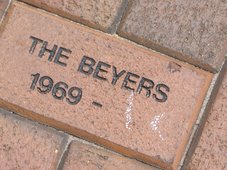Friday, October 19, 2007
The Schools Talk About Staph
Here's a letter the school system sent out to parents. It would be nice if the county also included what it is doing to counter the problem. The Sun reported that "health officials have instructed school administrators to conduct regular, daily cleaning and disinfecting of 'common surfaces' such as tables in libraries, lockers and desks in classrooms."
October 18, 2007
Dear Parents,
There has been recent media attention regarding the bacteria, Staphylococcus aureus, often referred to as “staph” and MRSA, methicillin-resistant Staphylococcus aureus. Staph bacteria are one of the most common causes of skin infections in the United States. MRSA is a type of staph that is resistant to some antibiotics. Many healthy people, carry staph, including MRSA, in their nose or on their skin and do not know they are carrying it. They usually do not get skin infections and do not have any signs or symptoms of illness. Sometimes staph can cause an infection and most of these skin infections are minor (such as pimples and boils) and can be treated without antibiotics. However, sometimes staph bacteria can cause serious infections. MRSA infections occur most frequently among persons in healthcare facilities who have weakened immune systems. Here and elsewhere in the country, MRSA infections are becoming more common in community settings, including schools and among athletes.
Staph, including MRSA, are spread by direct skin-to-skin contact, such as shaking hands, wrestling, or other direct contact with the skin of another person, or contaminated objects.
The symptoms of a staph or MRSA infection include pimples, boils, red/warm skin, or a wound that doesn’t heal. Most MRSA infections are treated by good wound and skin care. Sometimes treatment requires the use of antibiotics.
Routine cleaning procedures can reduce the transmission of staph or MRSA in the school setting, especially among users of athletic equipment. In addition the following have been shown to be effective in preventing spread:
* Clean hands regularly with soap and water or alcohol-based hand gel.
* Maintain good general hygiene with regular bathing.
* Keep wounds that are draining covered.
* Do not share items that may become contaminated such as towels, clothing, bar soap, razors, and athletic equipment that touches the skin.
* Launder clothing that has come into contact with wound drainage and dry thoroughly.
* If wounds are unable to be covered, refrain from activities that have skin to skin contact.
* Use a towel between skin and shared gym equipment
* Clean equipment and other environmental surfaces with which multiple individuals have contact with appropriate disinfectants.
Any questions or concerns may be directed to Donna Heller, Health Services Coordinator, 410 – 313-6812 or contact the Communicable Disease nurse at the Howard County Health department at 410-313-6110. More information may also be obtained, at www.cdc.gov.
Sincerely,
Donna Heller, RN, MHSA, CSN
Health Services Coordinator
Howard County Public School System
Maura Rossman, MD
Medical Director
Howard County Health Department
October 18, 2007
Dear Parents,
There has been recent media attention regarding the bacteria, Staphylococcus aureus, often referred to as “staph” and MRSA, methicillin-resistant Staphylococcus aureus. Staph bacteria are one of the most common causes of skin infections in the United States. MRSA is a type of staph that is resistant to some antibiotics. Many healthy people, carry staph, including MRSA, in their nose or on their skin and do not know they are carrying it. They usually do not get skin infections and do not have any signs or symptoms of illness. Sometimes staph can cause an infection and most of these skin infections are minor (such as pimples and boils) and can be treated without antibiotics. However, sometimes staph bacteria can cause serious infections. MRSA infections occur most frequently among persons in healthcare facilities who have weakened immune systems. Here and elsewhere in the country, MRSA infections are becoming more common in community settings, including schools and among athletes.
Staph, including MRSA, are spread by direct skin-to-skin contact, such as shaking hands, wrestling, or other direct contact with the skin of another person, or contaminated objects.
The symptoms of a staph or MRSA infection include pimples, boils, red/warm skin, or a wound that doesn’t heal. Most MRSA infections are treated by good wound and skin care. Sometimes treatment requires the use of antibiotics.
Routine cleaning procedures can reduce the transmission of staph or MRSA in the school setting, especially among users of athletic equipment. In addition the following have been shown to be effective in preventing spread:
* Clean hands regularly with soap and water or alcohol-based hand gel.
* Maintain good general hygiene with regular bathing.
* Keep wounds that are draining covered.
* Do not share items that may become contaminated such as towels, clothing, bar soap, razors, and athletic equipment that touches the skin.
* Launder clothing that has come into contact with wound drainage and dry thoroughly.
* If wounds are unable to be covered, refrain from activities that have skin to skin contact.
* Use a towel between skin and shared gym equipment
* Clean equipment and other environmental surfaces with which multiple individuals have contact with appropriate disinfectants.
Any questions or concerns may be directed to Donna Heller, Health Services Coordinator, 410 – 313-6812 or contact the Communicable Disease nurse at the Howard County Health department at 410-313-6110. More information may also be obtained, at www.cdc.gov.
Sincerely,
Donna Heller, RN, MHSA, CSN
Health Services Coordinator
Howard County Public School System
Maura Rossman, MD
Medical Director
Howard County Health Department
Subscribe to:
Post Comments (Atom)





No comments:
Post a Comment